wikiHow is a “wiki,” similar to Wikipedia, which means that many of our articles are co-written by multiple authors. To create this article, 25 people, some anonymous, worked to edit and improve it over time.
There are 9 references cited in this article, which can be found at the bottom of the page.
wikiHow marks an article as reader-approved once it receives enough positive feedback. This article received 13 testimonials and 86% of readers who voted found it helpful, earning it our reader-approved status.
This article has been viewed 160,340 times.
Learn more...
Worms are a common problem for dogs. Heartworms, hookworms, whipworms – the list is pretty formidable. With dog owners wary of pharmaceuticals and prescription drugs, many are turning to natural remedies to keep their canines healthy and worm-free. The great news is that there are many foods and herbs that can effectively eliminate the many different types of worms.
Steps
Using Herbs to Eliminate Worms
-
1Try chamomile or its cousin pineapple weed. These two herbs are great for preventing and expelling round- and whipworms. They also have many other health benefits as well, not the least of which are their ability to calm and act as an anti-inflammatory.
- Use a ¼ teaspoon of tincture directly into the mouth per 30 pounds every few hours. If you brew your own tea, use 1T every few hours.
- If you brew your own, make it strong: 4 tea bags (or 2T bulk flowers) to each cup of boiling water.
- Chamomile is non-toxic so you can give this to your pup fairly liberally without fear of side effects.[1]
-
2Use turmeric. This ancient herb's anti-parasitic properties are fortified by the fact that it also provides an environment that is not conducive to their growth while also healing worm-infested areas in your dog's digestive track.[2]
- Administer 1/8 to ¼ teaspoon per 10 pounds of weight every day. Make sure that your furry friend drinks plenty of water too so that it doesn't get constipated.
- Take once a day, after meals, for 1 week. Then for large dogs, administer it after meals daily every other week for two months.
- Long-term usage can be harmful so do not go over the two-month limit.
Advertisement -
3Give cloves a try. While their effectiveness is amplified when used in combination with other methods (e.g. wormwood or black walnut), cloves taken daily after meals can help eliminate those pesky worms.[3]
- For small dogs, use ¼ of a whole dry clove crushed and mixed into food 1 x daily for one week. Skip a week, then repeat the same dosage formula for the third week.
- For medium size dogs, use ½ of a whole dry clove and repeat the same dosage formula as that of small dogs.
- For large dogs use 1 whole dry clove and repeat the dosage formula as that of small dogs.
-
4Consider black walnut carefully. Made from the hull of the black walnut tree, this herb is excellent for eliminating heart and intestinal worms. While it is safer than most commercial de-wormers, it can be toxic if overused so great care must be taken. Think of it as your next-to-last resort herbal treatment.
- As the tannins and alkaloids may be dangerous to your pooch, please be certain to consult your veterinarian for use and dosage amounts.
-
5Use wormwood with a great deal of caution. There are sites that will recommend this herb but be very, very careful. Known to have serious negative effects on a dog's nervous system, liver and kidneys, this should only be used under the direct supervision of a veterinarian.[4]
-
6Make and administer parsley water. This helps keep your dog's digestive system happy and healthy during the de-worming process. Parsley is full of nutrients and also acts as a diuretic to help flush out all those worms that are desperately hanging on.
- Boil 1 quart of water and add one bunch of fresh parsley. Reduce heat and let simmer for 3 minutes. Strain, jar, and refrigerate the parsley water. Administer 1 T per 10 lbs of body weight once a day for 10 days.[5]
- For dogs with renal issues, substitute Rooibos tea for parsley. Known to support the immune system and inhibit cancer and other diseases, Rooibos has zero tannin and is much healthier for dogs suffering from renal issues.
Applying the Healing Power of Fruits
-
1Utilize the power of pumpkin seeds. The amino acid cucurbitacin in pumpkin seeds paralyzes works and expels them from the digestive tract. These seeds are very potent and effective, particularly against tape- and hookworm.[6]
- Grind up pumpkin seeds into a fine powder and add one teaspoon for each 10 – 15 lbs. of body weight daily. Do this for two weeks and then add wheat bran to the dog's diet; soak the bran in water and add an eighth teaspoon per 10 lbs. of body weight to larger animals and just a pinch for smaller ones.
- You can even feed the seeds to him directly as a treat. Just make sure you use the same measurement guidelines. Also be sure to use unsalted, organic pumpkin seeds.
-
2Get on the grapefruit seed bandwagon. These incredibly healthy seeds have many positive effects on the bodies of both humans and dogs. Proven to fight 800 bacterial and viral strains, it also supports the immune system, fights cancer, and, in this instance, are a natural for killing, weakening, and repelling parasites.[7]
- Grind up the seeds to a find powder. Sprinkle 8 mg for every 2.2 pounds of body weight (OBW) onto your dog's food. There are no restrictions as to how long to continue this treatment as grapefruit seeds are highly beneficial to your dog's overall health.
- Try GSE (grapefruit seed extract). Purchase this at your local health food store. For a minimal dosage, give your pooch .5 drops for every 2.2 pounds OBW orally. For maximum dosage, give your dog 10-15 drops per every 10 pounds OBW.
-
3Grind up papaya seeds. Rich in papain, an enzyme that will destroy the worms' outer coating and cause them to get weak and lose their hold on the intestinal wall, papaya seeds are also a great digestive aid.
- Grind the papaya seeds into a fine powder. Sprinkle 8 mg for every 2.2 pounds of body weight (OBW) onto your dog's food. There are no restrictions as to how long to continue this treatment as grapefruit seeds are highly beneficial to your dog's overall health.
-
4Feed your dog the papaya. If your dogs will eat it, the flesh of the papaya is also rich in papain. You might want to use this in combination with another method – even the papaya seeds. That way they will get all the health benefits and not rely solely on a small amount of papaya to do the job.
- There is a reason you only want to feed them a small amount. Feeding them a lot can lead to the same problems you can have with all fruits: too much in one end can lead to a loose result on the other.
- Feed your best friend fresh or dried papaya. Try to make it organic though. That will have the most papain and be the healthiest option for your dog.
-
5Feed your dog dried figs. Rich in the enzyme ficin, eating figs will destroy the worms' outer coating and cause them to get weak and lose their hold on the intestinal wall. Same general fruit warning: too much of a good thing can lead to too much of a bad thing. Feed your dog dried figs in moderation. One or two as a treat after meals is fine.
Using Food for De-worming
-
1Add food grade diatomaceous earth (DTE). Food grade DTE is a talcum-looking powder that consists of fossilized marine phytoplankton. Their microscopic, razor-like edges slice and scrape, dehydrating parasites (i.e. worms) and thus killing them.[8]
- For small dogs, sprinkle 1t on their food once daily. For dogs over 55 pounds, sprinkle 1T on their food once daily. Make sure you mix it well as it is so dusty that inhaling it can cause irritation in your pooch's respiratory system.
-
2Drip Oregon grape tincture in their mouths. The root of this plant is used for a variety of health-related applications and has been scientifically proved to be effective against parasitic worms. This is due to the presence of berberine, an anti-microbial alkaloid. You can get this at your local health food store (it may be labeled as an extract).
- Administer 12 drops per 20 pounds OBW.
- Do not use with diabetic animals, those with acute liver disease, or those that are pregnant or nursing.
-
3Cleanse their digestive systems. While you're eliminating worms from your furry friend it's important to keep in mind foods that, while not qualifying as cures, greatly assist in getting rid of the parasites while simultaneously enhancing your dog's overall health. Feeding them these foods will help heal their insides while promoting a healthy immune system as well.
- Carrots, beets, and turnips. ½ T per day of these root vegetables will scrape the mucus lining of the intestines in a healthy, safe way (worms live in the mucus). The vegetables are neither digested nor absorbed and do not change in pH balance. In combination with a de-worming cure, they help flush away the detritus and return your dog's digestive system to a healthy, happy state.
- Apple cider vinegar will help your animal's digestive track heal and reduce the irritation left by worms. It also improves their coat, boosts their immune system, and helps them absorb the most nutrients from their food. Feed 1t daily.[9]
- Add a half capsule of cayenne pepper per 50 lbs of body weight to food daily. This can be stepped up to a half capsule per 25 lbs of body weight twice a day for one week for quicker results.
Expert Q&A
-
QuestionWhat are the symptoms of heartworms in dogs?
 Natalie Punt, DVMDr. Natalie Punt is a Veterinarian and the Founder and CEO of mPet- a smart phone app for pet owners to store, manage and transfer their pets medical records and health information. She specializes in small animal emergency and general medicine and veterinary practice economics. Dr. Punt holds a BS in Biochemistry and Molecular Biology from The University of California, Davis, an MS in Biochemistry from The University at Buffalo, and a DVM from Western University of Health Sciences.
Natalie Punt, DVMDr. Natalie Punt is a Veterinarian and the Founder and CEO of mPet- a smart phone app for pet owners to store, manage and transfer their pets medical records and health information. She specializes in small animal emergency and general medicine and veterinary practice economics. Dr. Punt holds a BS in Biochemistry and Molecular Biology from The University of California, Davis, an MS in Biochemistry from The University at Buffalo, and a DVM from Western University of Health Sciences.
Veterinarian Dogs are often lethargic when they have heartworm disease. They might also not be able to move around as much, and they may have an occasional cough or a loss of appetite.
Dogs are often lethargic when they have heartworm disease. They might also not be able to move around as much, and they may have an occasional cough or a loss of appetite. -
QuestionIs diatomaceous earth safe for dogs?
 Nadine RichCommunity AnswerYes, it is completely safe. It's non-toxic to dogs (and cats) but is deadly to insects, so it works great for controlling internal and external parasites on dogs.
Nadine RichCommunity AnswerYes, it is completely safe. It's non-toxic to dogs (and cats) but is deadly to insects, so it works great for controlling internal and external parasites on dogs. -
QuestionHow do I get my puppy to eat ground turmeric?
 Community AnswerTry mixing just a little bit in 3 - 4 tablespoons of plain organic yogurt.
Community AnswerTry mixing just a little bit in 3 - 4 tablespoons of plain organic yogurt.
Warnings
- Always check for toxicity of any herb you are going to use. They are excellent when used correctly, but can be deadly when used without full information. Don't forget that arsenic and nightshade are "natural." You don't want natural as much as you want non-toxic to the dog.⧼thumbs_response⧽
References
- ↑ http://www.whole-dog-journal.com/issues/7_2/features/Calming-Herb-Chamomile_5607-1.html
- ↑ https://blog.myollie.com/home-remedies-for-worms-in-dogs/
- ↑ http://www.dogingtonpost.com/de-worming-your-dog-naturally/
- ↑ https://wagwalking.com/wellness/how-natural-herbs-arent-always-safe-for-dogs
- ↑ http://www.natural-dog-health-remedies.com/parsley-benefits.html
- ↑ http://www.dogsnaturallymagazine.com/pumpkin-seeds-natural-worms-dogs/
- ↑ http://www.natural-dog-health-remedies.com/gse-for-dogs.html
- ↑ http://www.dogsnaturallymagazine.com/benefits-diatomaceous-earth/
- ↑ http://www.natural-dog-health-remedies.com/apple-cider-vinegar-for-dogs.html
About This Article
To treat dog worms with food and herbs, grind grapefruit seeds or papaya seeds to a fine powder. Then, sprinkle 8 milligrams of the powder for every 2.2 pounds your dog weighs onto its food, since these seeds weaken and expel parasites. Alternatively, feed your dog 1-2 figs after meals for a similar effect. You can also try giving your dog 1 tablespoon of chamomile tea every few hours to help prevent and expel roundworms and whipworms. For more information, including how cleanse your dog’s digestive system, keep reading!
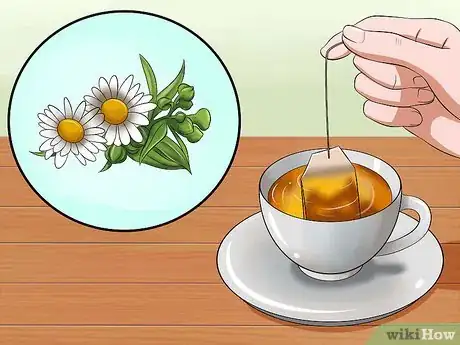
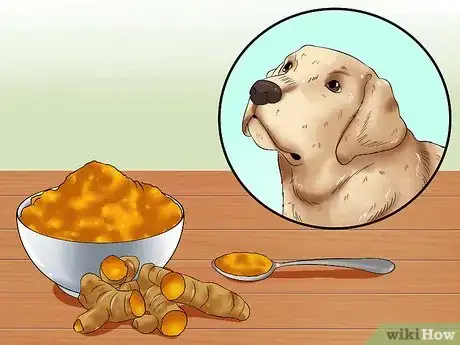
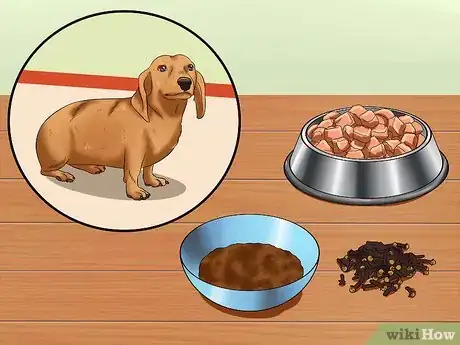
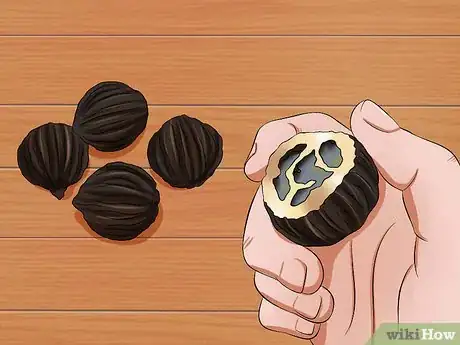
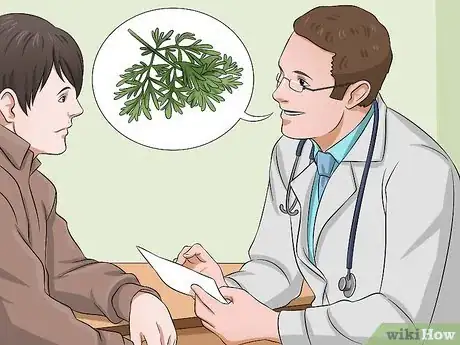
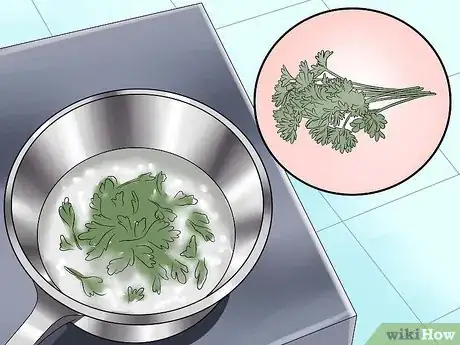
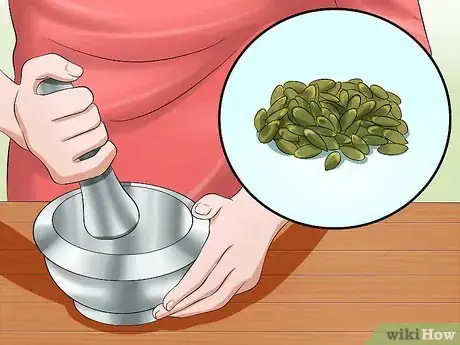
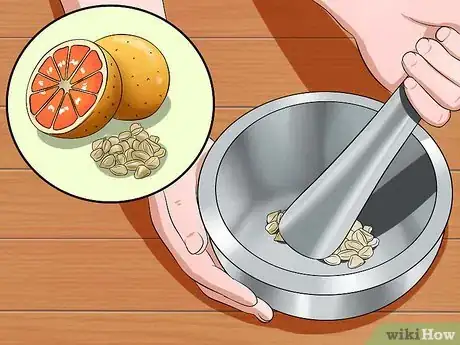
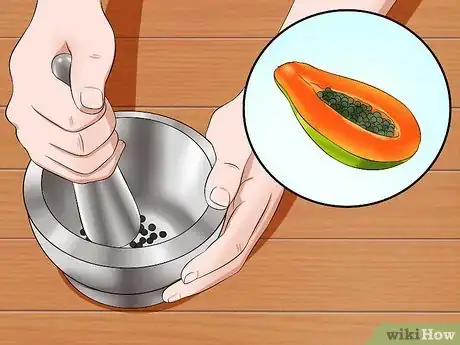
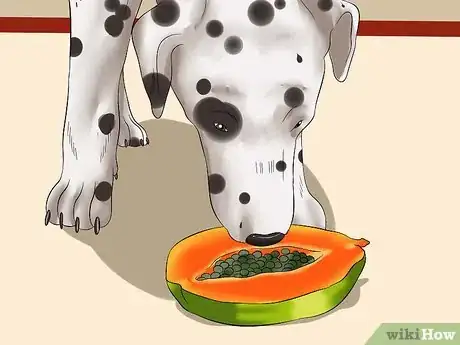
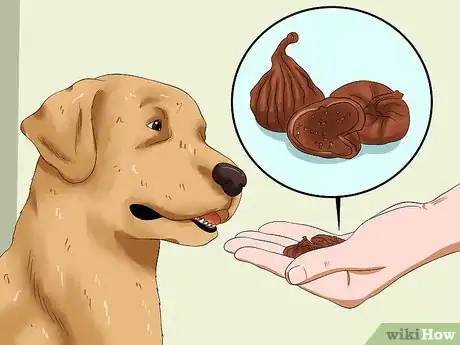
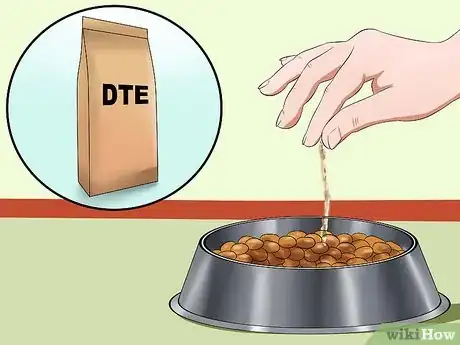
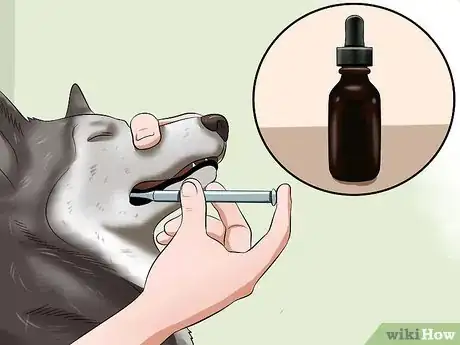
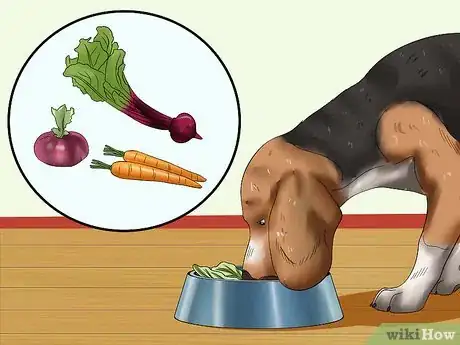
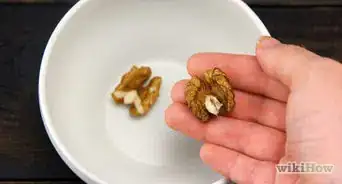




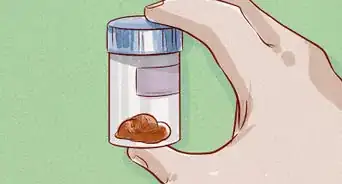




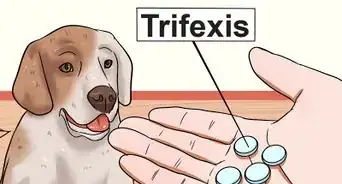











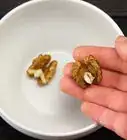






































Medical Disclaimer
The content of this article is not intended to be a substitute for professional medical advice, examination, diagnosis, or treatment. You should always contact your doctor or other qualified healthcare professional before starting, changing, or stopping any kind of health treatment.
Read More...